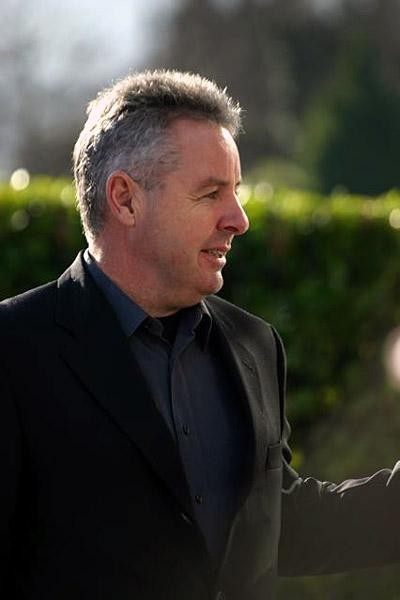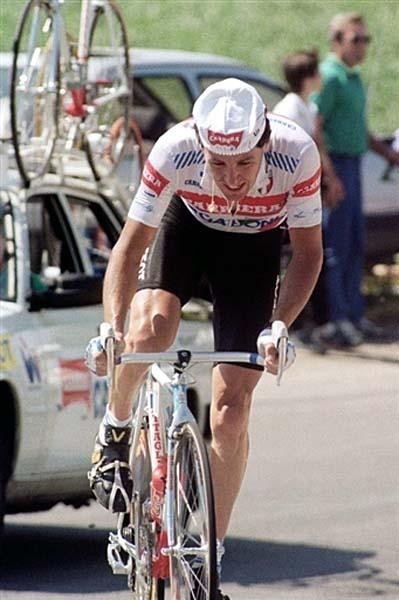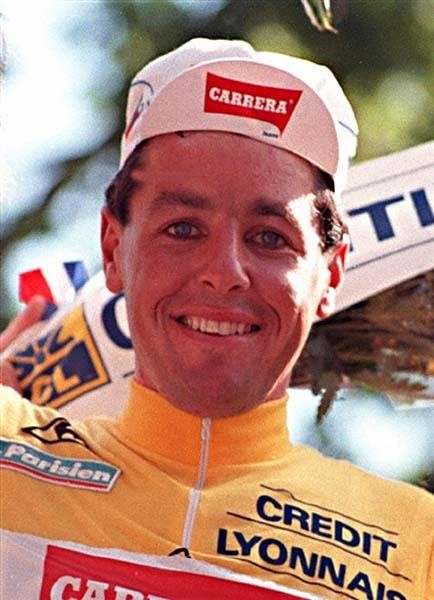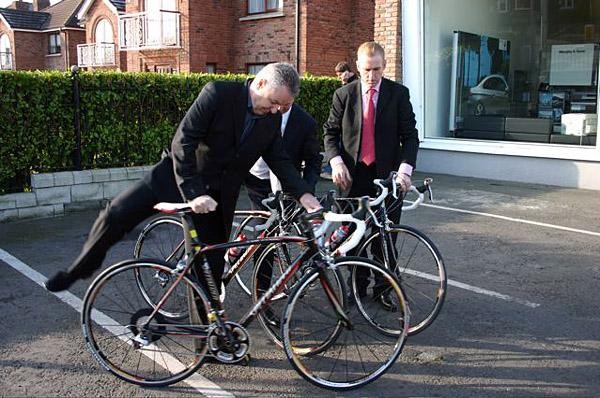Taking the triple
Twenty years ago Stephen Roche did what only one man had done before; he took the three biggest...




An interview with Stephen Roche, August 8, 2007
Twenty years ago Stephen Roche did what only one man had done before; he took the three biggest races in cycling over the period of a few months. His Tour victory was the cornerstone of this achievement and, like the edition just completed, was an open, unpredictable and ultimately very close race. The Irishman talked to Cyclingnews' Shane Stokes about the season where everything went right.
There are many parallels between this year's Tour de France and the edition waged two decades ago. Both had an absence of a patron, both were very open events, both went down to the wire in the penultimate day's time trial and both ended up with extremely close outcomes. At the time Stephen Roche's 40 second victory over Pedro Delgado was the second-closest on record, running just behind Jan Janssen's 38 second beating of Herman Van Springel in 1968; two years later Greg LeMond and Laurent Fignon's eight second difference set a new mark.
While the 2007 Tour didn't quite equal that, the 31 seconds covering first to third makes it the closest ever as far as all the podium places are concerned.
Roche headed into the 1987 Tour with a strong chance of doing well. The previous year had been been one to forget, the rider being seriously hampered by a knee injury suffered in a crash on the Bercy track during the Paris six-day. That fall happened in November 1985 and it was not until a year later that he was able to get the problem fixed via an operation.
He'd undergone an operation to treat that dodgy knee in the autumn of 1986, recovered steadily and set about putting in a very solid base that winter. When he started racing he quickly found form, winning the Tour of Valencia, placing fourth in Paris-Nice (losing victory due to a puncture), netting second in the Critérium International and Liège-Bastogne-Liège plus fourth in Flèche Wallonne. Just before the Giro he rode the Tour of Romandie and won two stages plus the overall classification there, proving he was in scorching form before his first big objective. That was the 1987 Giro d'Italia.
Roche is most often remembered as the Tour champion from that year, but he did far more than just win the French event twenty years ago this summer. He emerged victorious in the Giro and also scooped the world championships with a daring, unexpected and uncharacteristic final kilometre attack. In taking the Triple Crown of cycling, he equalled Merckx in 1974; it's a feat no-one has done since, and perhaps never will do so again.
Get The Leadout Newsletter
The latest race content, interviews, features, reviews and expert buying guides, direct to your inbox!
"The Giro was major," he told Cyclingnews recently. "It was my first win in a three-week Tour and in addition to that, the conditions in which I won made it special. [Roberto] Visentini wasn't the easiest rider to work with there, especially with him being Italian and the 1986 winner. It was a difficult situation."
Roche started well, winning the stage 1b time trial down the Poggio and then took the leader's pink jersey when his Carrera squad won the team time trial. He defended the maglia rosa for several days but then had a bad performance in the San Marino individual time trial, most likely as the result of a big crash on the tenth stage to Termoli. He ended the day over two and a half minutes behind team-mate Visentini but stubbornly fought back. Two days later the race headed for the summit finish of Sappada; Roche attacked early, refused team orders to return to the bunch and then held off the Carrera squad for many kilometres as they chased to protect Visentini's lead. There was carnage behind and while he was eventually hauled back, the Italian cracked on the final climb. Roche, suffering but defiant, grimly held on to the front-runners and edged back into the overall lead.
"From the Giro the standout memories are of the media coverage and the hassle I had with the general public on the roads during the days following the stage into Sappada, where I took the jersey again," he says. "And also of that particular day. When the occasion arose after the first climb I let go of the brakes and made a descent like you only make one in your lifetime. Well, I actually made two, because I made another one like that in the Tour a few weeks later.
"I went crazy on the descent and at the bottom I was one and a half minutes ahead of Visentini. I joined up with a breakaway group and was riding for many kilometres on flat roads with my whole team riding behind me. I was really angered by the fact that they were chasing. They were great moments, though, looking back, because there was a fight on and the adrenalin was really flowing."
Roche had a torrid time following that stage, with the Italian fans baying for blood, spitting at him and throwing punches. His team was on the verge of sending him home and most of the Italian press coverage was highly critical, fuelling the flames. Looking back, he's proud he stuck it out.
"If you had asked me before what I would do if those sort of conditions were in store, I would have said that I'd have gone home. So I kind of surpassed myself in what I did down there."
Roche got stronger as the race went on, finishing second on the tough mountain stage to Pila and then cementing his victory when he won the final time trial. He became the first ever Irishman to win one of cycling's Grand Tours and, crucially, this experience would benefit him when he went to the Tour de France several weeks later.
Chasing the maillot jaune
"Winning the Giro helped me in that I went to the Tour with nothing to lose," he says, speaking of the advantage he had over the rest of the peloton. "I had won a major Tour, I had also won the Tour of Romandie and the Tour of Valencia, I had a great season in the Classics. So I'd nothing else to prove, I didn't owe anything to Carrera at that point.
"That was important because when breakaways went away in the Tour, I was able to gamble a little bit more than if I had based the whole season around that race."
Roche found that he was very fatigued after the Giro and deliberately took a complete break from competition. "I was resting up after the Giro. I wanted to be 100% mentally right going into the Tour. I knew after the Tour of Italy that the form would come. I preferred to go into at 80% physically fit but 100% mentally ready, because I knew it was going to be really hard.
"I wanted of course to do a good prologue, so I trained specifically for that. I finished third there and this showed everybody that Stephen Roche was still there, still in good shape. I figured that was a good thing because if they [the other contenders] knew I didn't race between the Giro and the Tour then they would have thought my form would have gone off. So finishing third was good."
Roche gained a little more time over his rivals when Carrera won the team time trial. But he gave the clearest sign of his intentions when he took a stage win before the mountains. "Winning the first long time trial in Futuroscope was a big performance. It was 87 kilometres, one of the longest time trials in the Tour. Then of course my next target was to ride well on the first big mountain stage."
He got a confidence boost when he performed well there. His next big test was the mountain time trial to the summit of Mont Ventoux; he had expected to take yellow but on the day in question, French rider Jean-François Bernard rode out of his skin and dominated.
It was a shock of sorts, but all was not lost. "Of course, I didn't plan on losing so much time on Mont Ventoux," he says. "But I didn't lose a lot of time to my main rivals, the likes of Delgado and Mottet and that. Bernard did a super ride, though."
Mindful of the fact that the Frenchman would be fatigued after digging so deep, he and the other contenders managed to isolate him by attacking on the following day's stage to Villard de Lans. Roche and Spanish rider Pedro Delgado then went clear on the final climb and while the latter took the stage win, the Dubliner took over the yellow jersey from a deeply disappointed Bernard. He only held it for a day, though, conceding it to Delgado on the following day's climb to Alpe d'Huez.
It looked like the Tour was slipping away from him but the next stage to La Plagne would go down as the most dramatic in that – and many other – Tours. "That day was crucial," he explained. "I had a go at Delgado from 100 km out. I nearly then lost it all on La Plagne after I was caught, but then came back again on the final few kilometres. Tactically it was a big move.
"Earlier on I saw that Delgado was isolated from his team-mates on the climb of the Galibier, so I thought, 'now is the time to try something'. I gave it a go, but unfortunately Delgado got his team-mates together again then after the climb. I ended up doing the Col de Madeline on my own and then being caught in a small group just before the foot of La Plagne."
Roche knew he was in trouble, due to the fact that he was tired after the attack while Delgado – normally a better climber – was still fresh. Tactics were crucial here in helping him to survive.
"I knew my only chance was not to go with Delgado when he attacked me on that final climb. The idea was to let him go, give him a bit of space and then give it everything with four or five kilometres remaining and come back to him. He wouldn't be getting time checks so close to the line and so he wouldn't be able to react, he wouldn't think I was coming back.
"That was my plan and that proved to be the right decision because he basically kept his pace but I increased mine, and came back to within four seconds of him by the finish line. That was essentially the day Delgado lost the Tour."
Roche collapsed after the finish and was given oxygen, but made a strong recovery and rode well on the following day's stage to Morzine. He broke clear after the final climb, made another breakneck descent towards the finish line and took time out of Delgado. This ensured that he started the penultimate day time trial close enough to strike, and strike he did; he beat the Spaniard by 1 minute and 1 second in the race against the clock, reclaiming the yellow jersey by 40 seconds and thus winning the race.
"Riding onto the Champs Elysées on the last day in yellow was super. It is the most prestigious Avenue in the world and I was winning the biggest race," he remembers. "But certainly coming home [to Dublin] was an incredible day which will stay with me the rest of my life. The size of the crowds, the attitude of the fans and also the media. That was something else."
Landing the hat-trick
Roche had already had an incredible season, but more was to come. The world championships were being held in Villach, Austria that year and while he went there with the intention of riding for his friend and compatriot Sean Kelly, his excellent form, his tactics and the way the race unfolded saw a different result altogether.
"Everyone was saying that the worlds circuit wouldn't suit me, but I always thought I had a slight chance of doing something there," he said. "I thought, okay, a bunch sprint wouldn't suit me but I could always get away with a kilometre to go. I prepared the same was as usual, riding the races in Italy before the worlds.
"I went to Austria thinking I had an outside chance for myself, but at the same time knowing I could give Sean a hand. The race was 260 kilometres long and I was helping Sean right up until six kilometres to go. Then the last breakaway went, he missed it but I was in it, and that is when things started to change for me."
Roche said that he was surprised to have such good sensations, given that he had felt tired after the Tour. But he found that in the latter part of the championships, he was flying. "I had super legs. That day I was so motivated and so strong. When we finally got away I rode to the whole of the final three or four laps for Sean, chasing different breaks and that. On the second last lap myself and Sean got across to the breakaway. I rode across with Sean on my wheel and then went through the break and rode on the front. The attack went on the second last climb and I rode across to them.
"We got away and Sean missed the split. They weren't coming back in time so I had to do something. I knew myself that coming into a sprint finish, I was going to be fourth. But I knew also that there was a real sort of rivalry between Teun Van Vliet and Rolf Gölz. If I attacked early, there was a good chance that they would look at each other [to chase] because they were both two good sprinters and both had a chance of winning.
"That is what happened. I surprised them with three or four hundred metres to go. They looked at each other before reacting. Van Vliet didn't want to bring Gölz to the line and Gölz didn't want to bring Van Vliet. So that was my blessing, really."
The surprise result earned him a rainbow jersey, adding to the pink and yellow jerseys he took in the two other big races. It completed the hat-trick of Giro, Tour and Worlds; even if much of the rest of his career was hampered by injury, he had shown what he could do when that big natural ability, keen racing brain and sometimes-problematic body came together and worked at full capacity. Twenty years ago, firing on all cylinders, he was on top of the world.